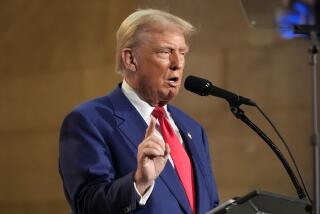Bush Renews Call for Tax Cuts
WASHINGTON — With congressional negotiators still far from a deal on economic stimulus legislation, President Bush sought Saturday to prod Senate action by touting proposed tax cuts and relief for unemployed workers.
The president, in his first weekly radio address since the economy was officially declared in recession, also argued that tax cuts enacted earlier this year were beginning to produce results until the Sept. 11 terrorist attacks jolted the nation.
“Now we need to act boldly to protect America’s economic security,” Bush said. “There are two immediate priorities for America’s recovery: We must bring quick help to those who need it most, and we must restore our economy’s growth.”
But the president’s speech disclosed no new proposals to jump-start congressional talks. In October, the House passed, on a largely party-line vote, a Republican-drafted bill containing about $100 billion in tax cuts and rebates for businesses and individuals. That plan was cheered on by the Bush administration.
But a Democratic alternative--with about $73 billion in aid for the unemployed, tax cuts for businesses and individuals and spending for homeland security--stalled in the Senate last month after another partisan vote.
Last week, efforts at compromise were only inching forward. Late Friday, chiefs of the Democratic-led Senate and Republican-controlled House tentatively agreed on a framework for further negotiations--with a bipartisan group of six lawmakers to hammer out the stimulus bill and a smaller group to study related health care issues. Talks were put off until Monday at the earliest.
On Saturday, Democrats made clear that they were prepared to attack Republicans if the talks fail.
In the Democratic radio response, Sen. Harry Reid of Nevada said, “Hard-line Republicans are playing politics with this economic recovery proposal.” The Senate’s No. 2 Democrat, Reid called the House plan a giveaway of “billions of dollars to multinational corporations--almost $2.5 billion to IBM, General Electric and Enron alone.
“Coming from Las Vegas, the entertainment capital of the world, I know something about show business, and the House Republican plan is show business.” Reid, whose speech avoided direct slaps at the president, urged Bush to “get Republicans back to the table.”
Both parties are acutely aware of the political stakes of the recession, which leading economists confirmed last week. With a midterm election year approaching, Bush is seeking to widen the thin 221-211 GOP majority in the House and retake a Senate barely controlled by Democrats, 50-49-1. One of the president’s objectives in those contests will be to deflect attacks on what Democrats inevitably will label a “Bush recession.”
In his speech, Bush said that many economists had warned him about the onset of a recession when he took office in January. “So we took quick action,” Bush said. “We passed the biggest tax cut in a generation”--a $1.35-trillion, 10-year package enacted last spring--”and we imposed some much-needed discipline on federal spending.
“And by the end of the summer,” the president said--in an interpretation that some independent economists would dispute--”we could see signs that the economy was responding.”
Bush said that in the aftermath of Sept. 11, he is proposing to extend unemployment benefits by 13 weeks in the states hardest hit by terrorism. The president also plugged a plan to give states more Medicaid funding for the uninsured and emergency grants for states to train displaced workers. Those concepts are likely to win praise from many Democrats. So, too, are the president’s proposals to cut taxes for low- and moderate-income workers and to lower certain taxes for businesses to encourage capital investment.
But Democrats are resisting other Bush proposals, including broader reform of the business tax code and an acceleration of the recent income tax cuts. Democrats instead blame such cuts for saddling the federal government with new budget deficits.
Praising the bipartisan cooperation that Congress gave him to mobilize the nation for war on terrorism, Bush said, “Now we need to do it again by helping dislocated workers and spurring economic growth.”
More to Read
Get the L.A. Times Politics newsletter
Deeply reported insights into legislation, politics and policy from Sacramento, Washington and beyond. In your inbox three times per week.
You may occasionally receive promotional content from the Los Angeles Times.










